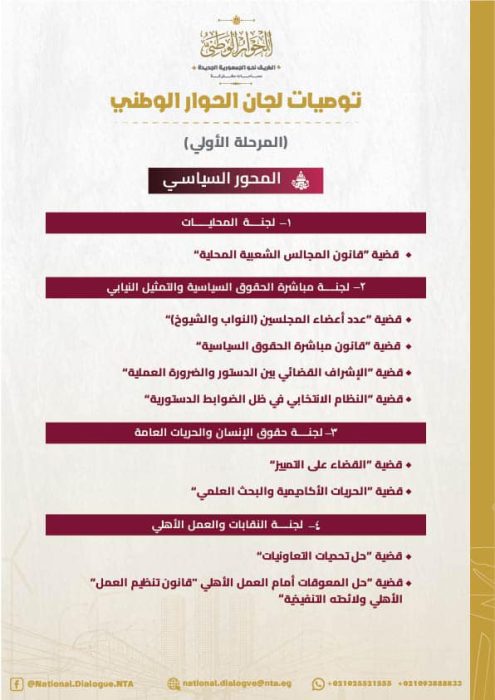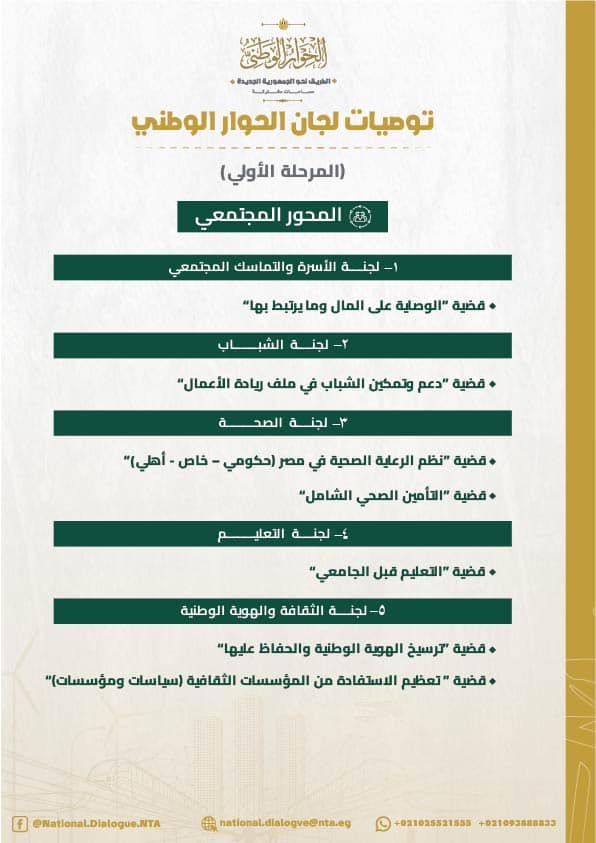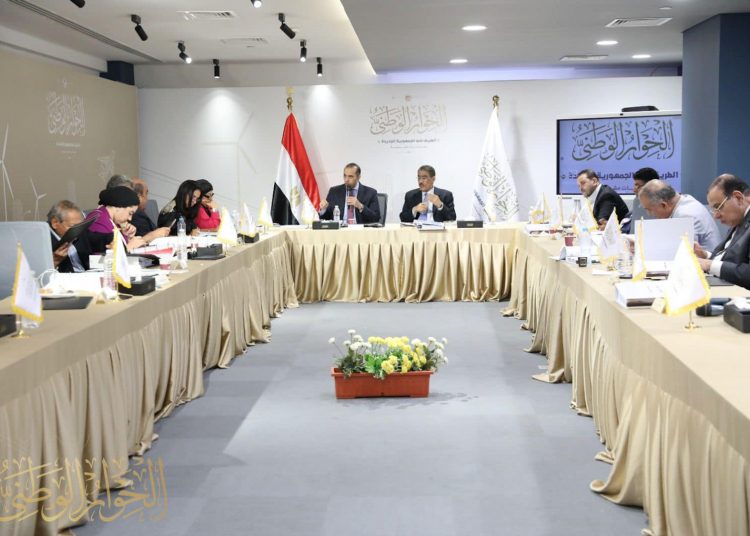The National Dialogue has released a report summarizing the recommendations and outcomes of 13 committees in the areas of politics, economics, and society.
The report reflects the final conclusions of the committees after holding specialized sessions to develop the proposals, the Coordinating Committee said in a statement.
The National Dialogue’s Municipalities Committee, under the political axis, has reached a consensus on the urgent need to pass the Local People’s Councils Law and hold their elections promptly.
The committee also agreed on using a combination of the absolute closed list by 75% and the incomplete proportional list by 25% as the electoral system for the local people’s councils.
The participants also recommend reviewing laws to provide more significant representation for workers and farmers who wish to run for local council positions and examining the status of cities in newly-developed urban communities to ensure that residents there have the right to fairly and transparently elect local council members. This will help ensure good governance and accountability, the report read.
The Municipalities Committee also called for providing mechanisms and measures to local people’s councils, including the formation of participatory planning committees, to allow citizens to participate in planning and managing projects and facilities in their communities.
The attendees also reached a consensus to offer practical and professional training to members of the local people’s councils. This will enable young leaders to participate in council elections in the future. Additionally, a comprehensive definition of the council’s roles and responsibilities will be developed, and effective oversight mechanisms will be put in place. Specific controls, such as questioning and interrogation, will also be implemented to ensure accountability among council members.
General Coordinator of the National Dialogue Diaa Rashwan announced that President Abdel Fattah El Sisi has received all the proposals put forth by the committees.

During the meetings of the Human Rights and Public Freedoms Committee, it was evident that there is a strong national agreement on the significance of prioritizing human rights issues as a common objective that all state institutions strive to attain. The conversations primarily centred on identifying the various strategies, processes, and options accessible to achieve these objectives.
The participants agreed that the Egyptian State, as outlined in the 2014 Constitution, has made significant progress towards achieving equality and equal opportunities. They noted that the government has given legislative and executive attention to protecting vulnerable groups such as women and people with disabilities. Additionally, attendees praised the recent law that guarantees freedom of worship for Christians, the statement read.
The State has also allocated resources towards ensuring a fair geographical distribution of development, including in North Sinai, South Sinai, Upper Egypt, and rural areas. The “Decent Life” project is considered by the participants to be the most significant in this regard as it showcases the Egyptian State’s genuine effort to bring about actual development to every part of the country, it added.
The National Dialogue also emphasized that a law should be quickly enacted to ensure the rights of the elderly and disabled individuals. Additionally, the National Council for People with Disabilities should be organized and the Commission for the Prevention of Discrimination should be established and managed in accordance with Article 53 of the constitution, which declares that all citizens are equal before the law, and should have equal public rights, freedoms, and duties, without discrimination based on religion, creed, gender, origin, colour, language, disability, social status, political affiliation, or geographical location.
For the commission to be established, any legislation must comply with the constitution and ratified international agreements that Egypt has agreed to enforce as these agreements are considered part of the internal legislation and hold the same rank as laws, as stated in the constitution, the statement read.
The commission is required to complete all tasks in addressing direct and indirect discrimination without bias towards the protection of national security, public order, and public morals, it added.
The participants have reached a consensus that the commission should possess the technical, financial, and administrative autonomy required for it to carry out its tasks effectively. They have also agreed that the president of the commission should be safeguarded against dismissal, except in situations stated by the law.
There was also a consensus about the importance of developing a strategy to suggest alternative measures for combating and penalizing hate speech, all while upholding the right to free expression.
During the discussion, it was suggested that the Anti-Discrimination Commission’s legislation should include specific guidelines for receiving reports and complaints. It was also recommended that the commission be given authority to handle urgent cases by issuing temporary procedures through a temporary matters judge upon request while ensuring that all investigations are conducted fairly and equitably.
The National Dialogue has recommended simplifying the process of professors travelling abroad for scientific missions to ensure that academics can attend international seminars and conferences, without missing any opportunities. Additionally, they called for expediting the approval process for inviting visiting professors and researchers from other countries to give lectures, attend events, meet faculty members, access its libraries, and hold seminars, conferences and panel discussions.
It was agreed that it is important to encourage both the private sector and civil society institutions to contribute to the cost of scientific research and postgraduate studies. However, it is crucial to set controls that ensure the funding sides remain impartial and the outcomes of the research remain independent.

The Committee for Political Rights and Parliamentary Representation has suggested a reasonable increase in members in the House of Representatives and the Senate in line with the noticeable growth in registered voters.
The committee reached a consensus that the spending limits in the Political Rights and Presidential Elections Laws should be reviewed. Additionally, they suggested that the National Elections Authority be given the authority to offer incentives to voters, such as the option to have a day off instead of voting on election day.
The recommendations included the introduction of electronic voting or voting by mail for Egyptians abroad
The committee has suggested prolonging the judicial supervision of the elections beyond January 17, 2024, until the necessary technical and administrative staff are recruited by the appropriate national authority.
The committee presented President Sisi with three potential electoral systems to choose from.
The first option is to maintain the current system, which divides the country into four constituencies with a 50/50 split between absolute closed lists and individual voting.
The second option is to switch to a proportional list system in 15 constituencies with 40 electoral seats each. This option includes the application of an electoral threshold system. It guarantees representation for women with 10 seats in each of the 15 constituencies and gives border governorates four seats each as per the constitutional article.
The third option is a mixed electoral system that combines the absolute closed list system, the proportional list system, and the individual system with a 25/25/50 split between them respectively.

The Committee on Trade Unions and Civil Work has reached a unanimous decision that a unified law for cooperative work should be established, the Supreme Council for Cooperation should be formed, and the role of the General Cooperative Union should be maximized to ensure its participation with the relevant ministries in setting the general policy for the cooperative sector.
To support cooperative unions, participants suggested offering a range of benefits, including exemptions from taxes on commercial and industrial profits, non-commercial professions, interest earned from deposits in banks and savings funds, customs taxes, statistical fees, import fees, additional fees, and all other taxes, fees and returns.
They also suggested that qualitative cooperative federations be given the independence to oversee their area of activity and audit the accounts and budgets of their cooperative units.
Regarding the Civil Labor Law, the participants have requested the modification of certain articles related to the formation of civil associations, their financial resources, and economic activities.
The Committee on Family and Community Cohesion has proposed changes to the guardianship provisions. They suggest that mothers be placed immediately after fathers in the hierarchy of guardians for minors’ money, above grandfathers. Additionally, there is a need to review all financial values outlined in the guardianship regulation law that may no longer be suitable for the current economic situation.
The proposals suggest determining a suitable sum of money to ensure flexibility in managing the affairs of minors without needing approval from a judge, especially in cases that are critical and urgent. However, the spending would be monitored and regulated under a specific legal framework that would be created to govern such spending.
The new system should digitalize procedures to help the Public Prosecution receive requests and complaints from guardians. This ensures faster and easier procedures, while also ensuring safe and low-risk investment of minors’ funds by establishing an appropriate investment fund to be managed by an independent economic department, which will achieve the intended return and purpose of its establishment.
It was also agreed to establish an independent body to have jurisdiction over minors’ funds.
During the National Dialogue, it was determined that a national strategy for entrepreneurship should be launched in Egypt.
This strategy would need to include specific regulations for financing and managing entrepreneurs’ activities and exit strategies as the existing legislative framework does not adequately meet the unique needs of entrepreneurs, whose activities are highly innovative, associated with high risks, and require a different legal investment structure than traditional companies.
It was agreed that a single database should be created for all entrepreneurship companies to facilitate interactions. Additionally, graduation projects from colleges, institutes, and schools focused on entrepreneurship should be linked to agricultural projects, prioritizing those related to food security.
The recommendations stated that it is important to have an organization that organizes entrepreneurial activities to ensure the success of projects and the exit of unsuccessful ones, as well as handle any consequences that may arise to ensure continuity and overall success.
The National Dialogue also suggested increasing entrepreneurship projects at both private and public free zones, as well as allocating investment zones for them. Additionally, the process of obtaining digital banking licenses should be sped up, with a focus on small and medium-sized businesses. Finally, an investment fund should be established to provide financial support for startups.

When it comes to healthcare systems in Egypt, there has been agreement among the National Dialogue Participants on the importance of expediting the implementation of the comprehensive health insurance system by expanding the primary healthcare system across the country, in accordance with the Health Care Authority’s operational standards, within a specific time frame of no more than 3-5 years.
Participants also agreed that the state should make use of its efforts to improve healthcare facilities and encourage the involvement of the private sector and civil society. This would require amending Article No. 3 of the Comprehensive Health Insurance System Law No. 2 of 2018. Additionally, it was suggested to expedite the discussion on the law that regulates medical liability in accordance with the latest international systems.
They also called for expanding health insurance coverage by including previously uncovered categories in preparation for the implementation of the comprehensive health insurance system, which necessitates the legalization of the status of those who cannot afford the costs of such a system by identifying bodies that can cover their expenses, such as the Decent Life Foundation, the Ministry of Solidarity, or others.
As part of its decisions, the National Dialogue has approved the incorporation of new health services into the comprehensive health insurance system, including therapeutic mental health.
The Education Committee has proposed unifying education policies and allowing civil society to participate in the educational process in areas that require it. The state will set the necessary controls and curricula. Additionally, plots of land will be provided and licenses will be granted to facilitate public utility consumption charges.
The National Dialogue has urged allocating funds collected for education services to more pressing matters. This includes recruiting new teachers, enhancing the education system, and expanding the teaching of national curricula and values in all types of education to promote the Egyptian identity.
According to the statement, participants stressed the need to prioritize the participation of specialized research institutes in creating curriculums that are suitable for various age groups and educational systems. It is also important to ensure that the curriculums align with the number of study days. The authorities can either shorten the curriculums or increase study days to maintain a proper balance.
The report suggests that the school year should begin on September 15 annually.
An agreement was made to explore the possibility of expanding the experimental kindergarten stage beyond just experimental schools. Additionally, regulations for the establishment of educational endowments, which own educational facilities, will be put in place.
Public and international schools are suggested to be twinned in an effort to reduce the disparities in the outputs of public and private education. Improvements will also be made in activity areas, curricula, teacher training, and infrastructure efficiency.
The dialogue also agreed to hold an annual education conference to review ways of partnership, cooperation and interdependence between governmental, private, and civil society schools; to reach innovative ways to finance education, identify labour market developments and what should be matched in the curricula and content provided to students, and train and qualify teachers for the comprehensive and sustainable professional development, by restructuring training plans so that they are not limited to educational and academic skills only, through accreditation and partnerships with new institutions.
The National Dialogue has proposed the establishment of alternative avenues for secondary education, based on students’ inclinations, skills, and abilities, rather than solely on their total score. Similarly, the mechanisms for university enrollment would be revised to align with these pathways. Additionally, the culture of community service would be promoted in schools through courses and activities.
The National Dialogue has called for introducing new subjects in primary education such as entrepreneurship, creative thinking, simulation models, and practical activities.
Additionally, the experience of the Parents Council and volunteering hours for parents in their children’s schools are suggested to be extended annually, based on their specialized skills.
A plan has been agreed upon to involve technical and specialized colleges in Egyptian universities. This will aid in training technicians and technologists in technical schools and institutes. Graduation projects will be shared with these colleges based on their respective specialization, available resources, labs, and geographic location.
Additionally, international cooperation protocols will be established with Arab countries and technical academies to promote technical exchange and increase specialized graduates who would obtain licenses that provide them with certain benefits when it comes to job placement, salary levels, and other opportunities.
The Private Investment Committee suggested the appointment of a Minister of Economy to handle investment and finance concerns, as well as to supervise a national economic policy.
The National Dialogue also recommended that the General Authority for Mineral Resources be quickly transformed into an economic body. It also suggested that simplified investment guides in various fields be developed and made available to all internal and external parties.
The recommendations also included expanding the establishment of public and private free zones with facilitated procedures.
Meanwhile, the Local Investment Committee agreed on the need to create a platform for businessmen to announce the needs required by their investments to allow owners of small investments to plan to meet them. It also recommended shortening the period for evaluating feasibility studies of banking system units to a maximum of 45 working days.
The Tourism Committee recommended expanding the issuance of licenses for tourism establishments to meet the growing demand in all geographical areas, and to set a tourism agenda that includes fixed annual events.
The recommendations included creating new types of tourism, such as desert, religious, and medical tourism, establishing training and awareness programs related to public morals on best practices to receive tourists, and providing places for tourist guidance and inquiries in various tourist sites.
They also include the provision of public toilets in streets and squares and the launch of mobile apps that provide tourists with information on service sites in tourist areas.

The Private Investment Committee suggested the appointment of a Minister of Economy to handle investment and finance concerns, as well as to supervise a national economic policy.
The National Dialogue also recommended that the General Authority for Mineral Resources be quickly transformed into an economic body. It also suggested that simplified investment guides in various fields be developed and made available to all internal and external parties.
The recommendations also included expanding the establishment of public and private free zones with facilitated procedures.
Meanwhile, the Local Investment Committee agreed on the need to create a platform for businessmen to announce the needs required by their investments to allow owners of small investments to plan to meet them. It also recommended shortening the period for evaluating feasibility studies of banking system units to a maximum of 45 working days.
The Tourism Committee recommended expanding the issuance of licenses for tourism establishments to meet the growing demand in all geographical areas, and to set a tourism agenda that includes fixed annual events.
The recommendations included creating new types of tourism, such as desert, religious, and medical tourism, establishing training and awareness programs related to public morals on best practices to receive tourists, and providing places for tourist guidance and inquiries in various tourist sites.
They also include the provision of public toilets in streets and squares and the launch of mobile apps that provide tourists with information on service sites in tourist areas.






Discussion about this post